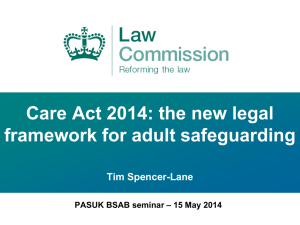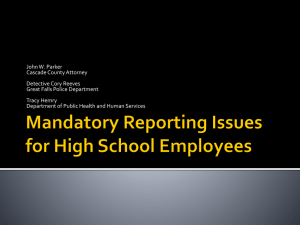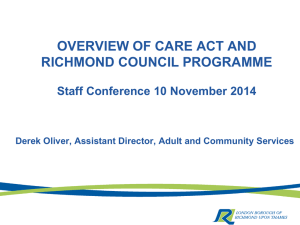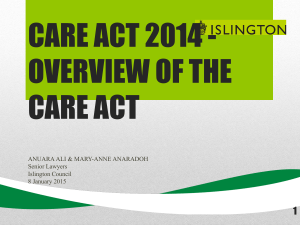Care Act
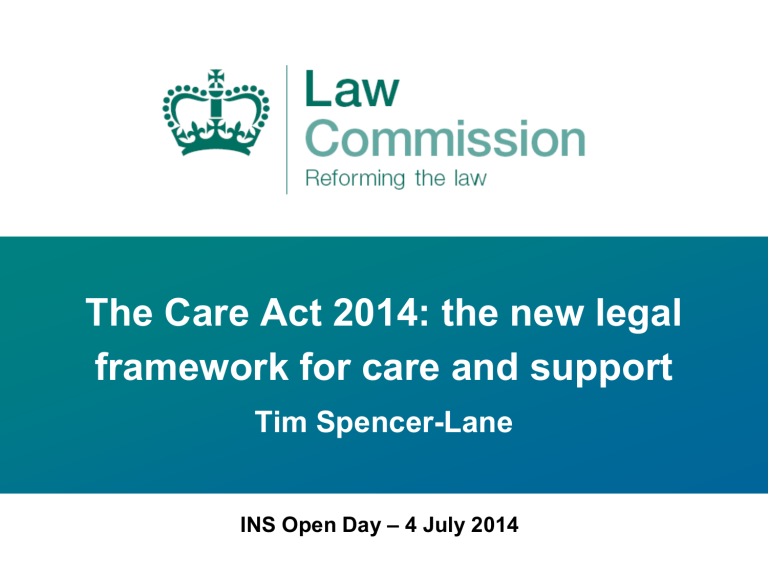
The Care Act 2014: the new legal framework for care and support
Tim Spencer-Lane
INS Open Day – 4 July 2014
Statutory framework
Health and
Social Care
Act 2001
National
Assistance
Act 1948
Health
Services and
Public Health
Act 1968
Carer’s legislation
NHS and
Community Care
Act 1990
Adult social care
Disabled Persons
(Consultation,
Recognition and
Services Act 1986
Chronically
Sick & Disabled
Persons Act
1970
Section 117 of the Mental
Health
Act 1983
Section 254 &
Sch 20 of the
NHS Act 2006
Section 29 National Assistance Act 1948:
“welfare arrangements for blind, deaf, dumb and crippled persons etc”
“ … persons aged 18 or over who are blind, deaf or dumb, or who suffer from mental disorder of any description and other persons aged eighteen or over who are substantially and permanently handicapped by illness, injury, or congenital deformity … ”
Section 47 National Assistance Act 1948: compulsory removal power
Joint duty on health and social services
discharged from compulsory detention
37, 45A, 47 or 48
6 weeks before orders can be challenged
Care Act 2014
Section 1(2): promoting individual well-being
1. personal dignity (including treatment of the person with respect)
2. physical and mental health, and emotional well-being
2. protection from abuse and neglect
3. control over day-to-day life (including over care and support)
4. participation in work, education, training or recreation
5. social and economic well-being
6. domestic, family and personal relationships
7. Suitability of living accommodation
8. the individual’s contribution to society
Section 1(2): well-being checklist
Minimum restrictions
Protect from abuse and neglect
Balance with well-being of carers
Assumption that the person is the best judge of their well-being
Individual well-being
The person’s views, wishes and feelings
Have regard to all the adult’s circumstances
Full participation in decision making
General duties
Preventing needs for care and support (s.2)
Promote diversity and quality in services (s.5)
Promote integration of health and social care (s.3)
Information and advice (s.4)
Duties to co-operate
Adult Social Care Project
General duty to co-operate with relevant partners (section 6)
Specific duty to request co-operation with relevant partners (section 7)
Assessment and eligibility
Sections 9-12: assessing needs
2. The process for assessment
Duty to assess where adult appears to need care and support
Right to refuse an assessment
Duty to consult adult, carers and any other named person
Assessment regulations
Section 13: eligibility criteria
2. The process for assessment
A single eligibility framework for all services
Duty on Government to set eligibility criteria in regulations
New national minimum threshold set at
“substantial”
New regulations in place from April 2015
Funding reforms, and next steps after assessment
Funding reforms
Adult Social Care Project
Cap on care costs:
• £72, 000 for older people
• Lower for people of a working age
• £0 for 18 year olds
Financial assessment
• £118,000 upper limit
• £17,000 lower limit
Mandatory deferred payment scheme
Section 18: duty to meet needs
Ordinary resident or no settled residence
Accrued costs exceed cap on care costs
No charge for service
Resources fall below financial threshold
Self-funder who makes a request
Next steps after assessment
Right to a care and support plan (s.25)
Personal budgets (s.26)
Care accounts (s.29)
Preferred accommodation provisions (s.30)
Direct payments (ss. 31 to 33)
Carer’s rights
Sections 1013: carer’s rights
Duty to assess any carer who appears to have needs for support
No need to request the assessment
No need to be providing substantial and regular support
New eligibility criteria for carer’s services
Duty to meet a carer’s eligible needs (s 20)
Adult safeguarding
Section 42: safeguarding enquiries
The local authority must make enquires it considers necessary (or cause enquiries to be made) care and support needs abuse or neglect unable to safeguard themselves
Section 43 and Schedule 2:
Safeguarding Adult Boards
Duty on local authority to establish an SAB
Objective is to help and protect adults at risk of abuse or neglect
SAB may do anything necessary or desirable to achieve this aim
NHS and police must nominate members with required skills and experience
Statutory safeguarding adults reviews (s. 44)
Duty to provide information to an SAB (s. 45)
Safeguarding powers
Adult Social Care Project
Repeal of section 47 of the National
Assistance Act 1948
No new power of entry to speak to a person at risk of abuse and neglect
Other reforms
Extended Human
Rights Act protection
Revisions to section
117 of the Mental
Health Act
Rights to advocacy
Care and support in prison
Right to portable assessments
A new appeals process against local authority decisions
Duties in cases of business failure
Transitional assessments for young people
My contact details:
Website tim.spencer-lane@lawcommission.gsi.gov.uk
www.lawcommission.justice.gov.uk
